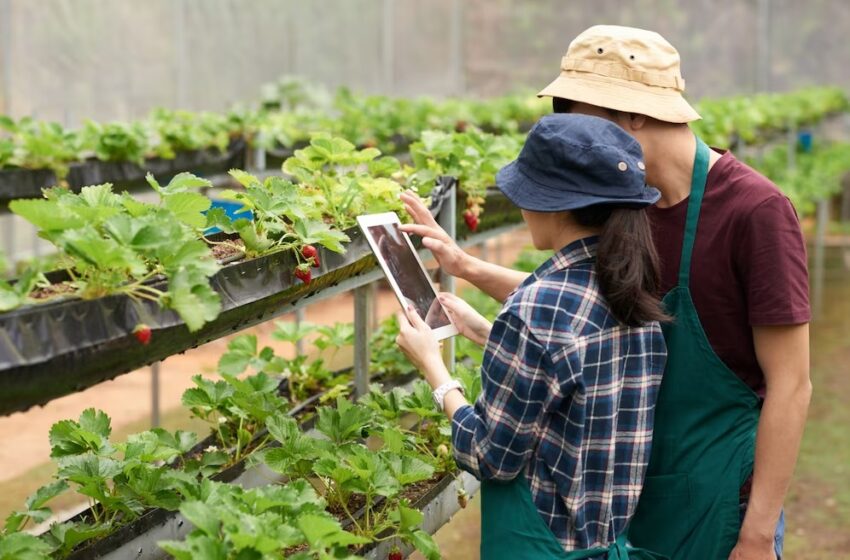The Emergence of Smart Agriculture and Its Economic Impacts

Introduction to Smart Agriculture
Smart agriculture, also known as precision agriculture, represents a significant shift in how food is produced. By leveraging technology such as IoT devices, AI, drones, and more, farmers can now make more informed decisions, leading to increased efficiency, reduced waste, and higher yields. This technology-driven approach is revolutionizing the agricultural sector, offering solutions to many of the challenges faced by modern farming.
The Rise of Smart Agriculture
The adoption of smart agriculture is growing rapidly. A report by Markets and Markets projected that the global smart agriculture market size is expected to grow from USD 13.7 billion in 2020 to USD 22.0 billion by 2025, at a Compound Annual Growth Rate (CAGR) of 9.8%. This growth is driven by the increasing need for more efficient farming techniques, sustainability, and the demand to feed an ever-growing global population.
Technologies Driving Smart Agriculture
Several technologies are at the forefront of the smart agriculture revolution:
- Sensors: Soil, water, weather, and crop sensors provide real-time data that can be used to optimize farming practices.
- Drones: Used for a variety of purposes including planting, crop spraying, and monitoring, drones are becoming an invaluable tool in precision agriculture.
- Automated Machinery: From tractors to harvesters, automation and robotics are increasing efficiency and reducing the need for manual labor.
- Data Analytics: AI and machine learning are being used to analyze data collected from various technologies, providing insights for better decision-making.
Economic Impacts of Smart Agriculture
Smart agriculture is not just changing the way food is produced; it’s also having significant economic impacts:
- Increased Crop Yield: With more precise planting, fertilizing, and watering, farmers can significantly increase their crop yields.
- Reduced Costs: Smart agriculture can lead to reduced use of water, fertilizer, and pesticides, which in turn lowers the costs for farmers.
- Environmental Benefits: By using resources more efficiently, smart agriculture can reduce the environmental impact of farming, potentially leading to economic benefits associated with sustainability.
- Rural Development: The adoption of these technologies can lead to the revitalization of rural areas, as they can make farming more profitable and appealing.
Challenges to Adoption
Despite its benefits, the adoption of smart agriculture faces several challenges:
- High Initial Investment: The cost of implementing smart agriculture technologies can be prohibitive for small and medium-sized farms.
- Skills and Training: There is a need for significant training and skills development for farmers to effectively use these technologies.
- Data Management and Security: Managing the vast amounts of data generated and ensuring its security is a considerable challenge.
Strategies for Successful Implementation
To overcome the challenges and reap the benefits of smart agriculture, several strategies can be employed:
- Government Support: Policies and subsidies that support the adoption of smart agriculture can make it more accessible.
- Partnerships: Collaborations between tech companies and the agricultural sector can lead to more innovative solutions and easier adoption.
- Education and Training: Providing farmers with the necessary training and resources is crucial for the successful implementation of smart agriculture.
The Future of Smart Agriculture
The future of smart agriculture is bright, with ongoing advancements in technology promising even greater benefits. We can expect:
- Integration of More Technologies: As technologies continue to advance, their integration into agriculture will become more seamless and efficient.
- Greater Accessibility: With the cost of technology decreasing and more tailored solutions being developed, smart agriculture will become accessible to more farmers around the world.
- Increased Focus on Sustainability: Smart agriculture will play a critical role in creating more sustainable food systems and addressing environmental concerns.
Conclusion: A New Era for Agriculture
Smart agriculture is ushering in a new era for the agricultural sector, transforming it into a high-tech industry capable of meeting the global demand for food in a sustainable and efficient manner. While challenges exist, the potential economic, environmental, and social benefits make the pursuit of smart agriculture an imperative for the future. As we continue to innovate and adapt, smart agriculture will undoubtedly play a pivotal role in shaping the future of food production and global food security.







